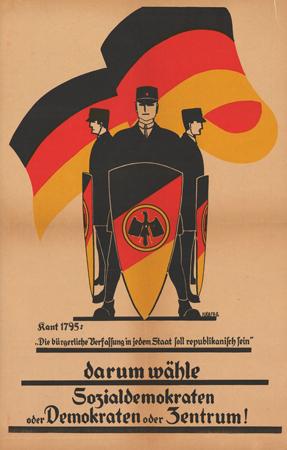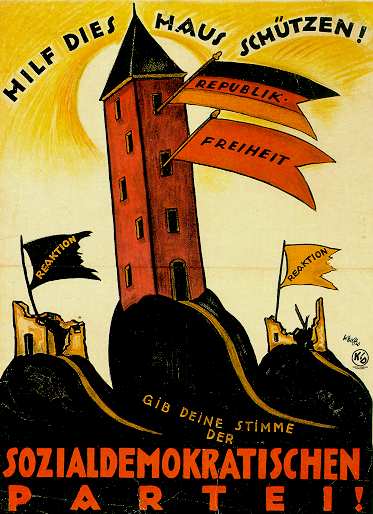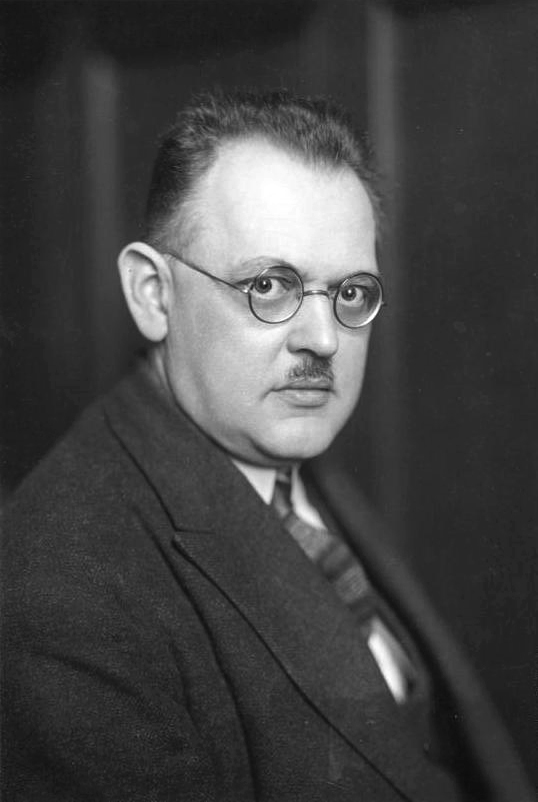Congratulations, THorius , to a great chapter. I really like Ebert and the SPD pushing back against the stab-in-the-back-myth and look forward to where you take this idea. Hopefully it will change popular the narrative about the founding of the Weimar Republic in the middle- to long-term.
I'm interested what happens with the Centre Party in the late 1920's: hopefully in your TL the left-leaning wing of the Centre Party is strengthened enough so that somebody else than Ludwig Kaas is elected party chairman (who after his election as party chairman in September 1928 led the party in a more right-wing authoritarian direction) and the Centre Party continues to support the Republic.
Likely Ebert wouldn't make that demand but members of DVP and the BVP and possibly even some Centre Party politicians within the Second Luther cabinet (if it is still in power, more on that below) might push for such a declaration and Luther might be inclined to support it in order to keep the coalition together.
There is a possibility that Hans Luther isn't chancellor before the plebiscite if the SPD, more confident from winning the presidential election, proves to be more flexible and agrees to a Grand Coalition of SPD, Centre Party, DDP and DVP, which was discussed IOTL but talks fell through. This could also lead to earlier federal elections if the Grand Coalition falls due to differences about the plebiscite and the question of Fürstenenteignung and in a campaign dominated by this topic the SPD would likely gain votes which could lead to a resumption of the Grand Coalition under a SPD chancellor (an earlier Müller cabinet or if he isn't Ministerpräsident of Prussia Otto Braun might be more interested in becoming chancellor).
Even if there is no declaration that the plebiscite is 'constitution-changing law' such a question might come before the Reichsgericht and I'm not sure how such a case would go. If the Reichsgericht declares the plebiscite invalid because it deals with 'constitution-changing law' and the necessary majority wasn't reached and orders a new plebiscite which as IOTL fails, that would have interesting consequences. Possibly the SPD (with Ebert and co. also still pissed off about the Beleidigunsprozess) and other parties (maybe Centre Party and DDP) might decide to push for the appointment of new judges, that are more loyal to the Weimar Republic (which at least the DVP would bitterly oppose and fight), which would benefit the benefit the Republic.
If Fürstenenteignung happens what does the right-wing do? IOTL there were rumors about the planning of a coup (Heinrich Class and other members of the Pan-German League plus possibly ideologically close officers and Class' office was searched but trial for high treason against Class was abandoned due to insufficient evidence in 1927, so who knows to what degree the rumors were true), I doubt that there would be a coup attempt in 1926 or 1927 but there could be more intense right-wing violence than IOTL, possibly even a resumption of political assassination (this might happen regardless of Fürstenenteignung as the election of Hindenburg did a lot to make the political right-wing more accepting of the Weimar Republic and here Hindenburg lost plus the SPD is pushing agressively against the 'stab-in-the-back-myth' and even 'insulted' the hero Hindenburg in the process which would incite right-wing elements).
Depending on where THorius wants to take the TL Marx might not stay long as Ministerpräsident and become chancellor after Luther's cabinett falls and depending on the composition of the third Marx cabinet (maybe the SPD supports him as a chancellor in exchange for Braun becoming Ministerpräsident of Prussia) either another Centre Party politician or Otto Braun would become the new Ministerpräsident. If Marx stays Ministerpräsident, which would change things in Prussia, Braun might decide to become chancellor either in 1926 or 1928 (in OTL Braun declared that he wasn't interested in the post in 1928).
The Spanish Civil war might not happen as IOTL (though there defintely would be a great deal of political violence and instability at least for some time) as with Weimar surviving and the Nazis not taking over the Comintern might not change their doctrine of social democracy being social fascism and thus no pivot toward the popular front model which would change things in Spain and France plus other countries (less cooperation with other left-wingers in the US for example and possibly less success for pro-Soviet penetration of these organizations and less success for Soviet espionage efforts in the US and possibly the UK).
In regards to Weimar foreign policy I would imagine a continuation of the 1920s: cooperatin with the UK and France in the West (especially if reparations aren't an issue anymore), cooperation with the Soviet Union (bargaining chips in any negotation with the UK and France plus military cooperation and cooperation against Poland) and trying to redraw borders in the East, especially with Poland, by peaceful means, though possibly more aggressive than in the 1920s (working towards Union with Austria might also be on the table). Fascist Italy would probably be a lot more diplomatically isolated (without Nazi Germany there would be no need for France or the UK to appease them) and might be less willing to go on foreign adventures (Ethiopia, Spain if the Civil War occurs, Albania...) as a result, especially if Germany, France and the UK work together to strengthen collective security in Europe (a more comprehensive sanction regime against agressors might be on the table, which sadly wouldn't deter Japan in China as the US wouldn't be party to such an agreement).
I'm interested what happens with the Centre Party in the late 1920's: hopefully in your TL the left-leaning wing of the Centre Party is strengthened enough so that somebody else than Ludwig Kaas is elected party chairman (who after his election as party chairman in September 1928 led the party in a more right-wing authoritarian direction) and the Centre Party continues to support the Republic.
... and with him as president there would very likely NOT being a presidential demand (as in OTL by Hindenburg or rather his entourage) declaring the question for plebiscite into a 'constitution-changing' law turning the necessary numbers of votes from relative majority of actual voters to absolute majority of all of the electorate.
Likely Ebert wouldn't make that demand but members of DVP and the BVP and possibly even some Centre Party politicians within the Second Luther cabinet (if it is still in power, more on that below) might push for such a declaration and Luther might be inclined to support it in order to keep the coalition together.
There is a possibility that Hans Luther isn't chancellor before the plebiscite if the SPD, more confident from winning the presidential election, proves to be more flexible and agrees to a Grand Coalition of SPD, Centre Party, DDP and DVP, which was discussed IOTL but talks fell through. This could also lead to earlier federal elections if the Grand Coalition falls due to differences about the plebiscite and the question of Fürstenenteignung and in a campaign dominated by this topic the SPD would likely gain votes which could lead to a resumption of the Grand Coalition under a SPD chancellor (an earlier Müller cabinet or if he isn't Ministerpräsident of Prussia Otto Braun might be more interested in becoming chancellor).
Even if there is no declaration that the plebiscite is 'constitution-changing law' such a question might come before the Reichsgericht and I'm not sure how such a case would go. If the Reichsgericht declares the plebiscite invalid because it deals with 'constitution-changing law' and the necessary majority wasn't reached and orders a new plebiscite which as IOTL fails, that would have interesting consequences. Possibly the SPD (with Ebert and co. also still pissed off about the Beleidigunsprozess) and other parties (maybe Centre Party and DDP) might decide to push for the appointment of new judges, that are more loyal to the Weimar Republic (which at least the DVP would bitterly oppose and fight), which would benefit the benefit the Republic.
If Fürstenenteignung happens what does the right-wing do? IOTL there were rumors about the planning of a coup (Heinrich Class and other members of the Pan-German League plus possibly ideologically close officers and Class' office was searched but trial for high treason against Class was abandoned due to insufficient evidence in 1927, so who knows to what degree the rumors were true), I doubt that there would be a coup attempt in 1926 or 1927 but there could be more intense right-wing violence than IOTL, possibly even a resumption of political assassination (this might happen regardless of Fürstenenteignung as the election of Hindenburg did a lot to make the political right-wing more accepting of the Weimar Republic and here Hindenburg lost plus the SPD is pushing agressively against the 'stab-in-the-back-myth' and even 'insulted' the hero Hindenburg in the process which would incite right-wing elements).
What happen to this deal ITTL ? ... with Brauns candidacy butterfied away ? ... will Marx become Prussian Ministerpresident instead ? ... what a Pandoras Box of possible butterflies 😜
Depending on where THorius wants to take the TL Marx might not stay long as Ministerpräsident and become chancellor after Luther's cabinett falls and depending on the composition of the third Marx cabinet (maybe the SPD supports him as a chancellor in exchange for Braun becoming Ministerpräsident of Prussia) either another Centre Party politician or Otto Braun would become the new Ministerpräsident. If Marx stays Ministerpräsident, which would change things in Prussia, Braun might decide to become chancellor either in 1926 or 1928 (in OTL Braun declared that he wasn't interested in the post in 1928).
Would a democratic anti-Communist Germany pivot to the Entente in the 1930s? Seems improbable given the history of WW1 and yet there would be a common distrust of Bolshevism and Fascism so who knows? I'm not imagining peace in Europe ad infinitum - you'd still have a Spanish Civil War and tensions elsewhere.
The Spanish Civil war might not happen as IOTL (though there defintely would be a great deal of political violence and instability at least for some time) as with Weimar surviving and the Nazis not taking over the Comintern might not change their doctrine of social democracy being social fascism and thus no pivot toward the popular front model which would change things in Spain and France plus other countries (less cooperation with other left-wingers in the US for example and possibly less success for pro-Soviet penetration of these organizations and less success for Soviet espionage efforts in the US and possibly the UK).
In regards to Weimar foreign policy I would imagine a continuation of the 1920s: cooperatin with the UK and France in the West (especially if reparations aren't an issue anymore), cooperation with the Soviet Union (bargaining chips in any negotation with the UK and France plus military cooperation and cooperation against Poland) and trying to redraw borders in the East, especially with Poland, by peaceful means, though possibly more aggressive than in the 1920s (working towards Union with Austria might also be on the table). Fascist Italy would probably be a lot more diplomatically isolated (without Nazi Germany there would be no need for France or the UK to appease them) and might be less willing to go on foreign adventures (Ethiopia, Spain if the Civil War occurs, Albania...) as a result, especially if Germany, France and the UK work together to strengthen collective security in Europe (a more comprehensive sanction regime against agressors might be on the table, which sadly wouldn't deter Japan in China as the US wouldn't be party to such an agreement).


